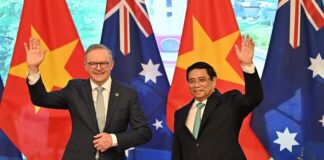Liu Xiaobo is a well-known Chinese dissident currently serving an 11-year jail sentence for co-authoring a pro-democracy manifesto known as Charter 08. Xiaobo is now even better known after being awarded the Nobel Peace Prize in early October.
The Nobel is, of course, a festival of geopolitical tensions and hypocrisies. It is one of the last bastions of a Cold War politics that upholds the West as the saviour of human rights and democracy. Prizes have been awarded to a long list of American statesmen like Woodrow Wilson, Theodore Roosevelt and Henry Kissinger, whose records on world peace and human rights leave much to be desired. Many balked last year when Barack Obama, who is overseeing wars in Iraq and Afghanistan, was given the “peace” award. Two weeks before, Obama had passed legislation to send more troops to Afghanistan.
Western leaders, threatened by China’s rising world power status, have delivered hypocritical pronouncement after hypocritical pronouncement about human rights in China. They have no solution for the people of China—but that should not cloud the very real fight against repression that does exist.
Xiaobo, like many who campaigned for freedom in the former Soviet states of Eastern Europe, wrongly supports the privatisation of state-owned assets. But his fight for democratic rights sits alongside an escalating militancy inside China’s working class that holds the potential to really shake up Chinese society.
Workers fight
Strikes at a Honda factory in Gaungdong in June and July triggered a wave of protests across China—and crucially, spread the demand for free trade unions. As China Labour Bulletin says, “It was clear that the long-simmering and deep-seated discontent and anger felt by many workers in the ‘factory of the world’ was beginning to boil over.”
A study of 100 workers’ protests by China Labour Bulletin confirms that protests and strikes are spreading and workers are gaining confidence. As well as protests against attacks on conditions, workers were also going on strike for higher wages, shorter hours, reductions in their workload and improved welfare benefits. Interestingly, 12 of the protests were against factory closures—an indication that China is not as immune from the global economic crisis as is often claimed.
The figures offer a glimpse at the kinds of horrific conditions these workers are resisting. Over 2600 miners were killed in industrial accidents last year (and that is just those officially reported). There are also reports that mentally-handicapped people are being forced to work at brick factories in Hubei for just 208 yuan a year—the equivalent of $31.
Workers on strike at Shenzhen Brother Industries earlier this year complained of a “heavy workload and no increase in pay” and, in reference to the fact they were fed only cabbage and carrots, complained that management was “treating them like rabbits”.
Something that also gives the lie to the West’s desire for human rights in China is the role of their very own corporations in this exploitation. A spate of worker suicides early this year at FoxConn, an Apple manufacturer, has been followed by recent news reports by the ABC that workers assembling Apple laptops and iPhones have become seriously ill after using a dangerous chemical. One worker told ABC, “My hands [are] numb. I can hardly walk or run.”
The sheer popularity of taking strike action has forced many local governments to take a conciliatory attitude. But the Chinese state is still able to detain and “re-educate” troublemakers solely on police authority for up to three years without trial. In any given year, upwards of 250,000 Chinese citizens are subject to “re-education” through labour.
One activist, Zhao Dongmin, has been detained since August last year for forming a workers’ rights group reporting corruption and abuses of power.
Xiaobo’s followers have received similar treatment. China has denounced the Nobel award as “obscene” and placed Xiaobo’s partner under effective house arrest to stop her speaking to the media. It is an attempt to hide an increasingly politicised discontent.
The struggle for democratic rights—like that of Xiaobo’s—is an important part of the struggle for freedom in China. The award has bolstered the confidence of democracy campaigners. A petition is being circulated on the Internet calling for his release and for democratic reforms, signed by 100 scholars, activists and lawyers. The hope must be that this campaign can give even more fuel to the fire of the most powerful resistance—that of the Chinese working class.





